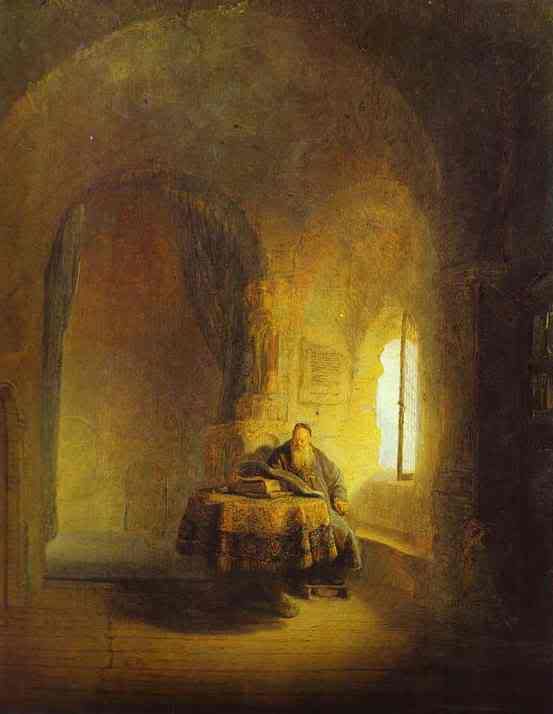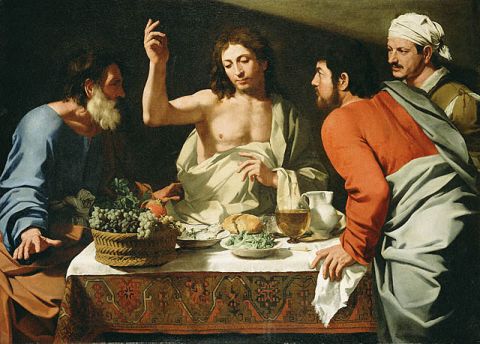The commentaries bear the characteristic mark of Kreeft's writing: precision of thought, and his Chestertonian brand of wit.
Book Recommendation: A Journey with Jonah, Part Three - Art and Literature Through Centuries
Book Recommendation: A Journey With Jonah, Part 3 - The Themes of Jonah in Non-Catholic Cultures
Book Recommendation - Commentaries on the Book of Jonah by Joseph Ratzinger and Fr Paul Murray OP
Pictorial Allegories of the Love of God Inspired by the Song of Songs - Part 3
The Unsurpassed Power and Effectiveness of the Prayer of Christ - Divine Office IV
 The Liturgy is the most powerful and effective form of prayer. This is the fourth in a series on the Liturgy of the Hours. The others are here.
The Liturgy (the Mass and Liturgy of the Hours) is not just powerful and effective. It is the most powerful and effective action of the Church on our behalf. Christ participated in it historically; and continues to do so eternally in heaven and on earth and we participate in His prayer through his mystical body, the Church.
The Liturgy is the most powerful and effective form of prayer. This is the fourth in a series on the Liturgy of the Hours. The others are here.
The Liturgy (the Mass and Liturgy of the Hours) is not just powerful and effective. It is the most powerful and effective action of the Church on our behalf. Christ participated in it historically; and continues to do so eternally in heaven and on earth and we participate in His prayer through his mystical body, the Church.
I have assumed that as a devout Jew, Christ participated in the Jewish liturgy, which followed a pattern of marking the hours, either three or seven times a day (and once at night) and praying the psalms (which is the basic form of the Liturgy of the Hours). The bible speaks of this pre-Christian practice and its continuation in the Church that He founded (see here) ; and we know from historical records that this tradition has continued to the present day. A lovely example that illustrates this continuation of the thread of tradition is the psalm tune or 'tone' called the Tonus Perigrinus. This came from the ancient tradition of the synagogue, was passed on to the Christian liturgy and became one of the standard chants of Gregorian chant. It has become one of the standard chants of Anglican chant too (listen here).
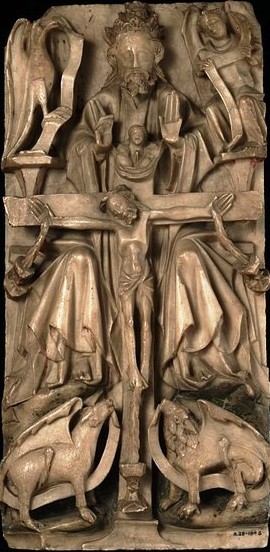 When we pray with the Church, we pray as part of the mystical body of Christ who is our priestly advocate to the Father. Liturgy (the Mass and the Liturgy of the Hours) is the worship of the Father, through the Son, in the Spirit. It is the means by which we enter into a profound relationship with God and enter directly into the dynamic mystery of love of the three persons of the Trinity. In doing so we become divine, yes divine. This is the source of power and effectiveness, and joy. This union with God is why God created us, and God became man to allow this to happen:
When we pray with the Church, we pray as part of the mystical body of Christ who is our priestly advocate to the Father. Liturgy (the Mass and the Liturgy of the Hours) is the worship of the Father, through the Son, in the Spirit. It is the means by which we enter into a profound relationship with God and enter directly into the dynamic mystery of love of the three persons of the Trinity. In doing so we become divine, yes divine. This is the source of power and effectiveness, and joy. This union with God is why God created us, and God became man to allow this to happen:
'The Word became flesh to make us "partakers of the divine nature": "For this is why the Word became man, and the Son of God became the Son of man: so that man, by entering into communion with the Word and thus receiving divine sonship, might become a son of God." "For the Son of God became man so that we might become God." "The only-begotten Son of God, wanting to make us sharers in his divinity, assumed our nature, so that he, made man, might make men gods."81 (Catechism of the Catholic Church, 460, quoting 2 Pt 1:4; St. Irenaeus in the second century AD; and St Athanasius in the 4th century AD; and Jn 1:14)
 ‘Christ Jesus, high priest of the new and eternal covenant, taking human nature, introduced into this earthly exile that hymn which is sung throughout all ages in the halls of heaven. He joins the entire community of mankind to Himself, associating it with His own singing of this canticle of divine praise. For he continues His priestly work through the agency of His Church, which is ceaselessly engaged in praising the Lord and interceding for the salvation of the whole world. She does this, not only by celebrating the eucharist, but also in other ways, especially by praying the divine office.’ (Sacrosanctum Consilium, 83; written in 1963)
‘Christ Jesus, high priest of the new and eternal covenant, taking human nature, introduced into this earthly exile that hymn which is sung throughout all ages in the halls of heaven. He joins the entire community of mankind to Himself, associating it with His own singing of this canticle of divine praise. For he continues His priestly work through the agency of His Church, which is ceaselessly engaged in praising the Lord and interceding for the salvation of the whole world. She does this, not only by celebrating the eucharist, but also in other ways, especially by praying the divine office.’ (Sacrosanctum Consilium, 83; written in 1963)
If we are participating in the divine nature (albeit at this stage only temporarily and by degrees for us as individuals) it is no wonder that this prayer is powerful.
'Accordingly, every liturgical celebration, as an activity of Christ the priest and of his body, which is the Church, is a sacred action of a pre-eminent kind. No other action of the Church equals its title to power or its degree of effectiveness.' (Sacrosanctum Consilium, 7, [my emphasis])
Those who want to learn to do the Divine Office, you might approach a priest or religious (ie monk or nun) and ask them to show you. Alternatively, the Way of Beauty summer retreats at Thomas More College of Liberal Arts will teach you how to pray the Liturgy of the Hours and how you can realistically incorporated it into a busy working or family life
Images from top: anonymous, Christ Pantocrator, Monreale, Sicily, 12th century; anonymous, 'Mercy Seat' Trinity with four evangelists, English alabaster, early 15th century; Duccio, detail, showing the Agony in the Garden of the Maesta, 14th century;
Images below text: Bartolomeo Cavarozzi (1590 - 1625), Supper at Emmaus. The artist was an Italian who lived in Spain; Rembrandt, Supper at Emmaus
The Practice of Lectio Divina (3): Ephrem the Syrian on the Inexaustible Treasury of Scripture
 Scripture, Part of the Foundation of Joy (part three; part one here; part two here) This is from the Office of Readings of Sunday Week 6 of Ordinary Time. It is from a Commentary on the Diatassaron by St Ephrem the Syrian. It certainly inspires me to keep on reading the bible and makes this point that God speaks to me at the level I am at, and so the same piece of scripture can say different things to me on the next reading. The sub-heading is: God's Word is an inexaustible spring of life.
Scripture, Part of the Foundation of Joy (part three; part one here; part two here) This is from the Office of Readings of Sunday Week 6 of Ordinary Time. It is from a Commentary on the Diatassaron by St Ephrem the Syrian. It certainly inspires me to keep on reading the bible and makes this point that God speaks to me at the level I am at, and so the same piece of scripture can say different things to me on the next reading. The sub-heading is: God's Word is an inexaustible spring of life.
'Lord, who can comprehend even one of your words? We lose more of it than we grasp, like those who drink from a living spring. For God’s word offers different facets according to the capacity of the listener, and the Lord has portrayed his message in many colours, so that whoever gazes upon it can see in it what suits him. Within it he has buried manifold treasures, so that each of us might grow rich in seeking them out.
The word of God is a tree of life that offers us blessed fruit from each of its branches. It is like that rock which was struck open in the wilderness, from which all were offered spiritual drink. As the Apostle says: They ate spiritual food and they drank spiritual drink.
 And so whenever anyone discovers some part of the treasure, he should not think that he has exhausted God’s word. Instead he should feel that this is all that he was able to find of the wealth contained in it. Nor should he say that the word is weak and sterile or look down on it simply because this portion was all that he happened to find. But precisely because he could not capture it all he should give thanks for its riches.
And so whenever anyone discovers some part of the treasure, he should not think that he has exhausted God’s word. Instead he should feel that this is all that he was able to find of the wealth contained in it. Nor should he say that the word is weak and sterile or look down on it simply because this portion was all that he happened to find. But precisely because he could not capture it all he should give thanks for its riches.
Be glad then that you are overwhelmed, and do not be saddened because he has overcome you. A thirsty man is happy when he is drinking, and he is not depressed because he cannot exhaust the spring. So let this spring quench your thirst, and not your thirst the spring. For if you can satisfy your thirst without exhausting the spring, then when you thirst again you can drink from it once more; but if when your thirst is sated the spring is also dried up, then your victory would turn to harm.
Be thankful then for what you have received, and do not be saddened at all that such an abundance still remains. What you have received and attained is your present share, while what is left will be your heritage. For what you could not take at one time because of your weakness, you will be able to grasp at another if you only persevere. So do not foolishly try to drain in one draught what cannot be consumed all at once, and do not cease out of faintheartedness from what you will be able to absorb as time goes on.'
I have just one comment on the icon of St Ephrem. Ephrem lived from the first part of the 4th century and in 1920 was proclaimed by Pope Benedict XV as a Doctor of the Church. Among his famous writing are his Hymns of Paradise. The sunken cheekbones in the icon are used to show asceticism. Ephrem was not a monk as monasticism as we know it was only beginning to take hold in Egypt during this period. However, he lived in a Christian community that had similar disciplines and he is venerated in the East as an example of monastic discipline. Hence the sunken cheeks.

Monastery in the Syrian desert (this is of St Moses the Ethiopian). I hope their spring is inexaustible, just looking at it makes me feel parched!
The Practice of Lectio Divina - a Source of Joy (2)
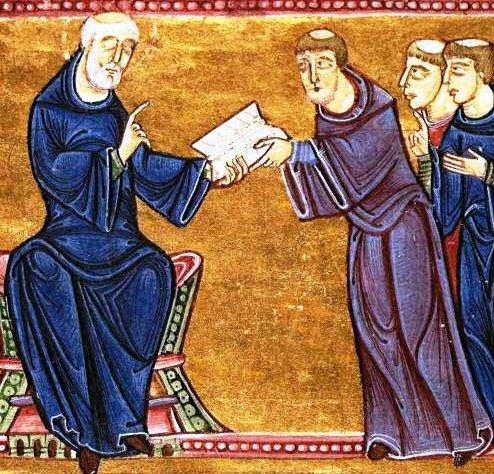 Scripture, Part of the Foundation of Joy (part two; read part one, here) I am not an expert in this at all, but I thought that my experiences of trying (and often failing) to learn the technique and practice it, might be a starting point for others who wish to make a beginning also. Also I would encourage any of you who have experience to offer any helpful thoughts for the benefit of the readership…
Before I even began my investigation of lectio divina, the point was made to me that it is good to go to someone who can structure my spiritual life so that all of these things have a unity that allow them to nourish and support my ordinary daily activities. The danger is that I just tack one more devotion onto the daily list of personal obligations without proper understanding of how it relates to the other things that I do and the whole thing becomes a burden, in which I feel guilty if don’t tick all the boxes that day.
Scripture, Part of the Foundation of Joy (part two; read part one, here) I am not an expert in this at all, but I thought that my experiences of trying (and often failing) to learn the technique and practice it, might be a starting point for others who wish to make a beginning also. Also I would encourage any of you who have experience to offer any helpful thoughts for the benefit of the readership…
Before I even began my investigation of lectio divina, the point was made to me that it is good to go to someone who can structure my spiritual life so that all of these things have a unity that allow them to nourish and support my ordinary daily activities. The danger is that I just tack one more devotion onto the daily list of personal obligations without proper understanding of how it relates to the other things that I do and the whole thing becomes a burden, in which I feel guilty if don’t tick all the boxes that day.
Now for lectio divina itself: the first part is lectio. This just means reading. The first thing I have to do is select a passage to read. I was told to start with the gospels. If I aim to do it regularly, it was suggested that I try to go through the bible systematically, even if this means that it will take years to go through it once. One person told me another systematic approach to begin with is to pick the readings, or just the gospel reading, for Mass that day. If you don’t have a Missal to hand, www.universalis.com has the readings each day.
So having selected the passage I say a short prayer, that I might be receptive to whatever God wants to say to me through the passage I read. And then I read away. As phrases catch my attention I re-read. If nothing catches my attention, I just re-read the whole allotted passage a number of times. One helpful piece of advice given to me was that God will speak to me at the level I am at. So I shouldn’t worry that I am not a scripture scholar who isn’t instantly aware, for example, of the parallels between Old and New Testaments or the allegory that it contains, and so on.
 However, it is a good idea, I was told to support this lectio, if I have time, with reading of commentaries on scripture, that my understanding might increase in time. I was told to be careful with modern commentaries as many (including some by Catholic writers) do not adopt a starting postion of faith that this is the inspired Word, and so a skepticism creeps into their work. I play safe and go for the Church Fathers and even here I let the Church guide me through her liturgy. The Office of Readings has a passage every day by a Church Father and very often this is a commentary on scripture. So I let the Church educate me as I worship God the Father in the Liturgy. Here is this dynamic, described yesterday, of Liturgy illuminating Scripture and Scripture intensifying my participation in the Liturgy. Again, the Universalis website is a great source for the Office of Readings each day.
However, it is a good idea, I was told to support this lectio, if I have time, with reading of commentaries on scripture, that my understanding might increase in time. I was told to be careful with modern commentaries as many (including some by Catholic writers) do not adopt a starting postion of faith that this is the inspired Word, and so a skepticism creeps into their work. I play safe and go for the Church Fathers and even here I let the Church guide me through her liturgy. The Office of Readings has a passage every day by a Church Father and very often this is a commentary on scripture. So I let the Church educate me as I worship God the Father in the Liturgy. Here is this dynamic, described yesterday, of Liturgy illuminating Scripture and Scripture intensifying my participation in the Liturgy. Again, the Universalis website is a great source for the Office of Readings each day.
The second part is meditatio. This means ‘I think’. This was always a source of confusion for me. In this age of post-Beatles, Maharishi Yogi pop culture, I thought that meditating on a phrase meant repeating it like a mantra in Eastern meditation. And that the goal was one of the elimination of thought; or at the very least it was a passive process of just letting my mind drift in the ethereal breeze and see what thoughts might crop up, but without reacting to them. I couldn’t work out what I was supposed to be doing here – it seemed to be contradictory to the idea of trying to understand the passage, which involved the application of reason to what was being read. My predicament wasn’t help by many of the books that I first read about Lectio Divina. Some (perhaps influenced by pop culture too) read as though they had been written by a beatnik writer who described it as an invitation for me to indulge in my emotions through undirected random or stream-of-consciousness style thought, on the assumption that because I had just read a bit of the bible, this was God at work in my mental processes. I was suspicious of this undirected approach.
The way out of this changed when I was told something about the distinction between Christian and Eastern, non Christian, ideas of meditation. Meditate, in the Christian tradition means more ‘meditate upon’, the same as ‘think’. So while in meditatio I do pause and allow for the prompting of the Spirit in the form of occurring thoughts and ideas; when they do occur I react to them by mulling over them, perhaps asking myself: what does this mean? Is there something that applies to me directly? How can I act on this in the rest of the day? And so on.
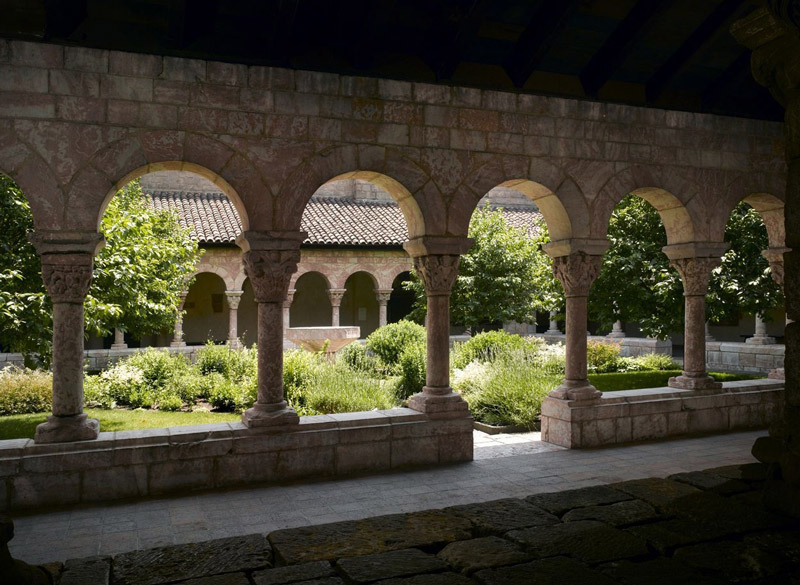 This leads to the third stage, Oratio – prayer. So here I can ask God to show me how to act on something or help me in those areas that the meditation highlighted. The worry for me here was that sometimes I didn’t seem to have any profound lessons or thoughts to react to. This meant I didn’t know what to pray, except perhaps, ‘please give me some profound lessons or thoughts’. Here again I was given some helpful advice by someone with much greater experience than me. He said that quite often this happened to him and he didn’t think it was anything to worry about, he simply said some prayers in which he praised God for having this chance to hear his Word.
This leads to the third stage, Oratio – prayer. So here I can ask God to show me how to act on something or help me in those areas that the meditation highlighted. The worry for me here was that sometimes I didn’t seem to have any profound lessons or thoughts to react to. This meant I didn’t know what to pray, except perhaps, ‘please give me some profound lessons or thoughts’. Here again I was given some helpful advice by someone with much greater experience than me. He said that quite often this happened to him and he didn’t think it was anything to worry about, he simply said some prayers in which he praised God for having this chance to hear his Word.
I find that once I start reading, I can move gently from one to the other, reading, thinking, saying a short prayer and then reading again.
The fourth part is contemplatio. This is contemplative prayer. As you can imagine, this originally caused me confusion too. I thought contemplation and meditation meant pretty much the same thing. And given the fact that I didn’t initially understand what meditation was, the inclusion of contemplation just compounded it even further. So I needed another explanation: in contrast to mediatio , this part is passive. It is passive in the sense that it is a state of mind that is given to us as a gift from God and actively pursuing it cannot guarantee its occurance. If I have understood the descriptions properly, it is a state of stillness of mind; one of just being with God and it sounds something like the descriptions of the beatific vision when we are in full union with God in heaven. However, as it is a gift from God, I should be careful in interpreting anything from about it or concluding anything about my spiritual development, or about how well I have done the first three stages. God either gives it to me or he doesn’t. Contemplation, therefore, is not a reward or goal of the first three stages, in that sense, it is just something that might happen, or it might not over which we have very little control. For myself, all I can say is that if it happened to me, I didn’t notice (which I’m guessing probably means that is hasn’t happened!).
The reason I do this is the reason that I am driven to do any of these things. I believe that ultimately and generally, I will be the happier for doing so, rather than any immediate reward of a pleasant emotion or feeling during the process.
At this point, I was going to include another passage from the Office of Readings at the end of this, but given the length of this piece so far, so I’ve decide d to tack on a Part Three, which will appear tomorrow. It is by the 3rd century Father, Ephraim the Syrian.
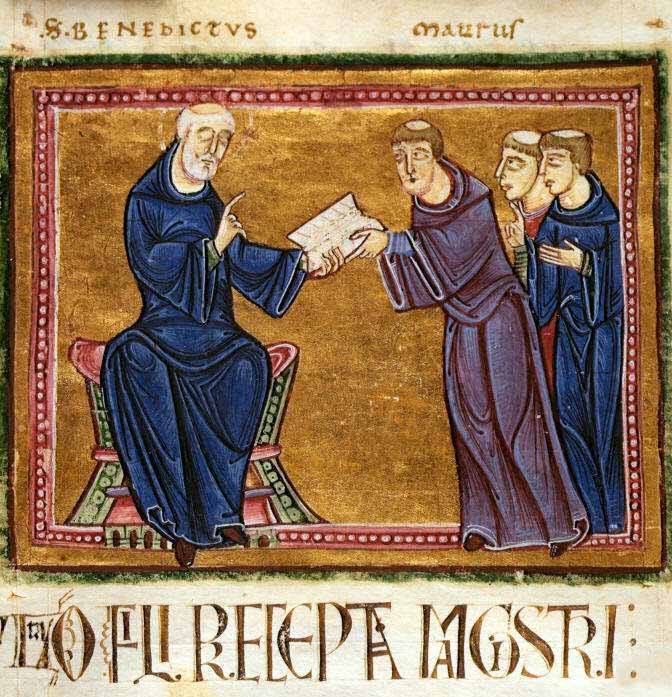
The Practice of Lectio Divina - a Source of Joy (1)
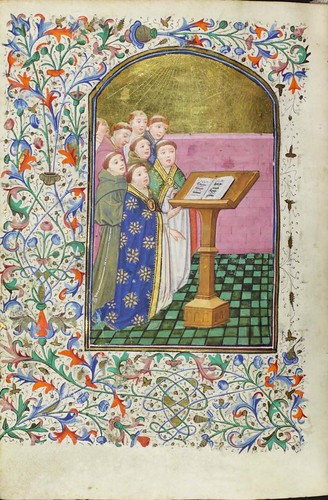 Scripture, part of the foundation of joy (part one, part two tomorrow)
Scripture, part of the foundation of joy (part one, part two tomorrow) Here is St Bonaventure (whose picture is shown) from the Office of Readings of Monday Week 5 of the year:
Here is St Bonaventure (whose picture is shown) from the Office of Readings of Monday Week 5 of the year: